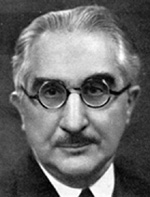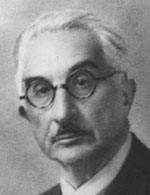Personnes
Henri Maspero
15 Dec 1882 (Paris) - 17 March 1945 (Buchenwald)
Henri was the son of the famous Egyptologist Gaston Maspero, whose statue stands a block or so from the Collège de France. After studies in history and literature, Henri joined his father in Egypt, and in 1905 published the study Les Finances de l'Egypt sous les Lagides. Back in Paris, he obtained a license to practice law in 1907, and in that same year graduated in Chinese from the École de Langues Orientales Vivantes, where, like Pelliot before him, he studied under Chavannes and Sylvain Lévi. Again like Pelliot, he went to the Hanoi center of the École Français d'Extreme-Orient in 1908, first as a research fellow and presently (1911) as a professor. During his time in the Hanoi center he made many journeys to investigate the languages and customs of the peoples of French Indo-China.
In 1918 he succeeded Chavannes in the Chair of Chinese at the Collège de France, where Pelliot, fresh from his bibliographic triumphs at Dunhwang, had since 1911 occupied a specially created Chair of Central Asian Languages. The two of them were to occupy somewhat complementary positions in the French scholarship of Asia for the rest of their lives. On taking the Chair of Chinese, Maspero promptly entered the linguistics wars by criticizing some assumptions in Karlgren's École sur la Phonologie Chinoise, in his 1920 article La Dialecte de Tch'ang-an Sous les T'ang. This work won the 1921 prize from the Academy of Inscriptions and Belles-Lettres. Karlgren accepted some of Maspero's suggestions in his subsequent publications. Maspero's very influential researches on the history of Dauism (Pelliot was chiefly occupied with Buddhism, and particularly with Nestorianism and other forms of Christianity in Asia) began to appear in 1922 with the short article École sur le Taoism; they did much to create this field as a subject of scholarly attention. His more general public lectures on Chinese history culminated in his 1927 work La Chine Antique. Though by now inviting updates and reconsiderations at many points, this remains one of the best extended treatments of early Chinese history and thought. Maspero thus had what Pelliot conspicuously lacked, the gift of synthesis. He was also a redoubtable source critic, and in 1925 had showed what he could do in this line when he put his mind to it, exposing (in Le Roman de Sou Ts'in) the Shr Ji's disastrous reliance on the chronology of the fictitious Su Chin from the disreputable Jan-Gwo Tsv. Maspero's investigation of Mician logic (Notes sur la Logique de Mö-tseu et Son École), another pioneering work, appeared in 1927. Maspero was notable for his contacts with Japanese scholarship; his first paper in a Japanese journal was Les Commencements de la Civilisation Chinoise (Shinagaku v5 #2, 1929). This again corresponded with a Pelliot weak point: Pelliot, according to one of his students, knew no Japanese.
Maspero's inspired suggestion (1930) that early Chinese had affixation was largely dismissed by Karlgren and others, but has in recent years been taken up seriously, and found to be productive. On the textual side, Maspero had reviewed Karlgren's monograph On the Authenticity and Nature of the Tso Chuan in 1928, and himself entered the fray with La Composition et la Date du Tso Tchouan in 1931. In succession to Chavannes, who had edited the texts discovered on the first two of Aurel Stein's expeditions, Maspero accepted responsibility for the the third set of Stein documents. He worked on this exceedingly difficult project throughout the early Thirties, finally submitting the completed manuscript in 1936 (due to political and financial exigencies, and to the interruption of WW2, it was published, with a few additional annotations by Arthur Waley, only in 1951). He then embarked on a series of studies which showed the benefit of his early legal training, beginning with Le Serment dans la Procédure Juridique de la Chine Antique (1935) and continuing with Le Régime Féodale et le Propriété Foncière Dans la Chine Antique (1936). These investigations continued through 1938. His last published article was the trifling Rapport sur l'Activité de l'École Français d'Extrême-Orient . . . lu dans le Séance du 7 Juillet 1939.
Despite the defeat of France and the German occupation of Paris (June 1940), Maspero was able to continue his researches and his lectures. Maspero was a very shy man, and a terrible lecturer, who would often talk past the hour. By statute, all courses at the Collège de France are open to all comers, and one bum (known locally as "le clochard du Maspero") was particularly addicted to Maspero's course on Dauism. He would come in off the streets to hear the lectures. But the bum was a fastidious and exacting listener, who had perhaps formed his tastes and expectations on Granet. Maspero would run on until it was a quarter of an hour past time for adjournment, and the bum would say, "It's about time to finish this, no?" And Maspero would hastily wind up the topic.
Lectures and research, however, were the sum of it. Publication opportunities vanished (the journal T'oung Pao itself ceased publication in 1942, not to resume until 1947). As an ironic footnote, there appeared in 1942, in a German periodical, a review of the early volumes of Franke's history of China which Maspero had submitted in 1939. Maspero was arrested, on suspicion, by the German occupation authorities in April 1942, but released after a few days; the same thing happened to Pelliot. The two were both present, shortly afterward, at a clandestine meeting of the Société Asiatique. The outgoing Pelliot was besieged with questions about his recent experiences with the Occupation authorities; the diffident Maspero was left more or less alone. In addition to his teaching at the Collège de France, Maspero at this time lectured at l'École Nationale de la France d'Outre-Mer, and succeeded to Granet's chair of Chinese Civilization at the Sorbonne; he also headed the more wide-ranging department “Religions de la Chine” at the École Pratique des Hautes Études. His own researches at this time concerned the economic history of China, a subject still undeveloped as of this writing.
In June 1944 came the Allied invasion of France, and the mobilizing of the long-underground Resistance. Maspero's older son Jean, then 19, had been involved in what Paul Demiéville calls "a dangerous affair" in Paris. Maspero himself was arrested in July 1944 for "suspicion of terrorist activities," and deported to Buchenwald; Madame Maspero was sent to Ravensbrück. Jean Maspero escaped and joined the American army, only to be killed in action in October. Maspero continued to be held in Block 56 at Buchenwald, despite a formal plea for his release submitted by Erich Haenisch (no other German Sinologue at the time being willing to sign it). On 17 March 1945, long after the liberation of Paris, as one of 30,000 inmates killed in the weeks before Buchenwald was itself liberated (on 15 April, by Patton's US Third Army), Maspero died at the age of 62.
Maspero's work was wide-ranging but not frivolous. In an age when Western Sinologues had not yet reached the boundaries of their subject, he showed the way to many a promising frontier. He had the gift of questioning, and though some of his ideas (affixing in early Chinese) have proved to be happier than others (a later date for the death of Confucius), his spirit of raising questions, and his example of sound consecutive work in developing answers (the dialect of Chang-an, the early history of Buddhism in China) are an important legacy for those of us who come after.
Bibliography
- Frank A Kierman Jr (tr). China in Antiquity. Massachusetts 1978. Contains a bibliography of Maspero's writings on p498-511, and a biographical Foreword dated 1975 by Paul Demiéville. A long Introduction by Denis Twitchett gives an estimate of Maspero's scholarship in historical context.
- Laurent Sagart. The Roots of Old Chinese. Benjamins 1999. The history of Maspero's affixation theory is reviewed at p2-4.
Links
- Tübingen Religion and Fascism Conference 2004 (dedicated to the memory of Maspero)

Wolfgang Behr, Vera Dorofeeva-Lichtmann, Denis Sinor, and Pierre-Etienne Will (Collège de France) contributed to this profile.
13 Dec 2005 / Contact The Project / Exit to Reference Page



